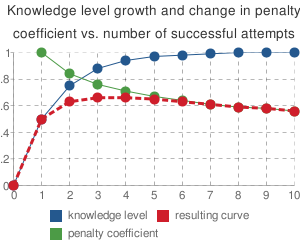CUMULATE parametrized asymptotic knowledge assessment
From PAWS Lab
Parameterized asymptotic knowledge assessment algorithm is an attempt to overcome shortcomings of its non-paramterized version.
Contents
Computation
The formula below is used to update the knowledge levels of concepts (c) addressed in a problem (p). This formula reflects the following principles (identical to the predecessor algorithm).
- there are several domain concepts (knowledge items, rules, productions) involved in solving a problem; the knowledge of each of them is updated proportionally to the others
- knowledge is updated only upon correct user answers, there is no penalty for errors
- solving a problem correctly multiple times will result in diminishing update (growth) of the knowledge level of the concepts as the number of successes grows
in addition:
- the initial level of knowledge, speed of knowledge growth, and penalty for repetitive (correct) solutions to the problem - are now adjustable parameters
- Ko - is the starting level of knowledge, Ko ∈ [0, 1]
- res - result of user action (0 -error, 1 - correct);
- Wc,p - is a weight of concept c in problem p
- ΣWc,p - is the sum of weights of all concepts in problem p
- succattp - is a number of successful solutions to problem p prior to current attempt
- pV - speed of knowledge growth parameter, pV ∈ [0, 1]
- OPP - over-practicing parameter, controlling the penalty for repetitively solving one problem (correctly), OPP ∈ [0, 1]
Examples
Below is a graph of concept's knowledge level growth vs. number of successful attempts to apply it in a problem. Every time the concept is applied correctly in a new problem.

(alternatively via Google Chart API)

